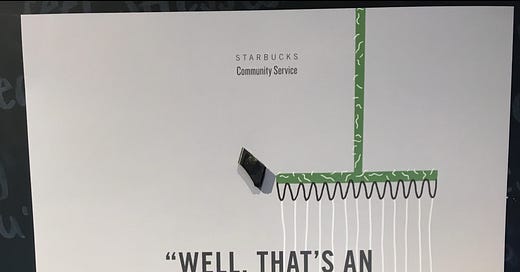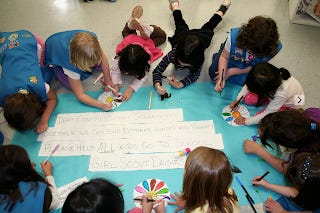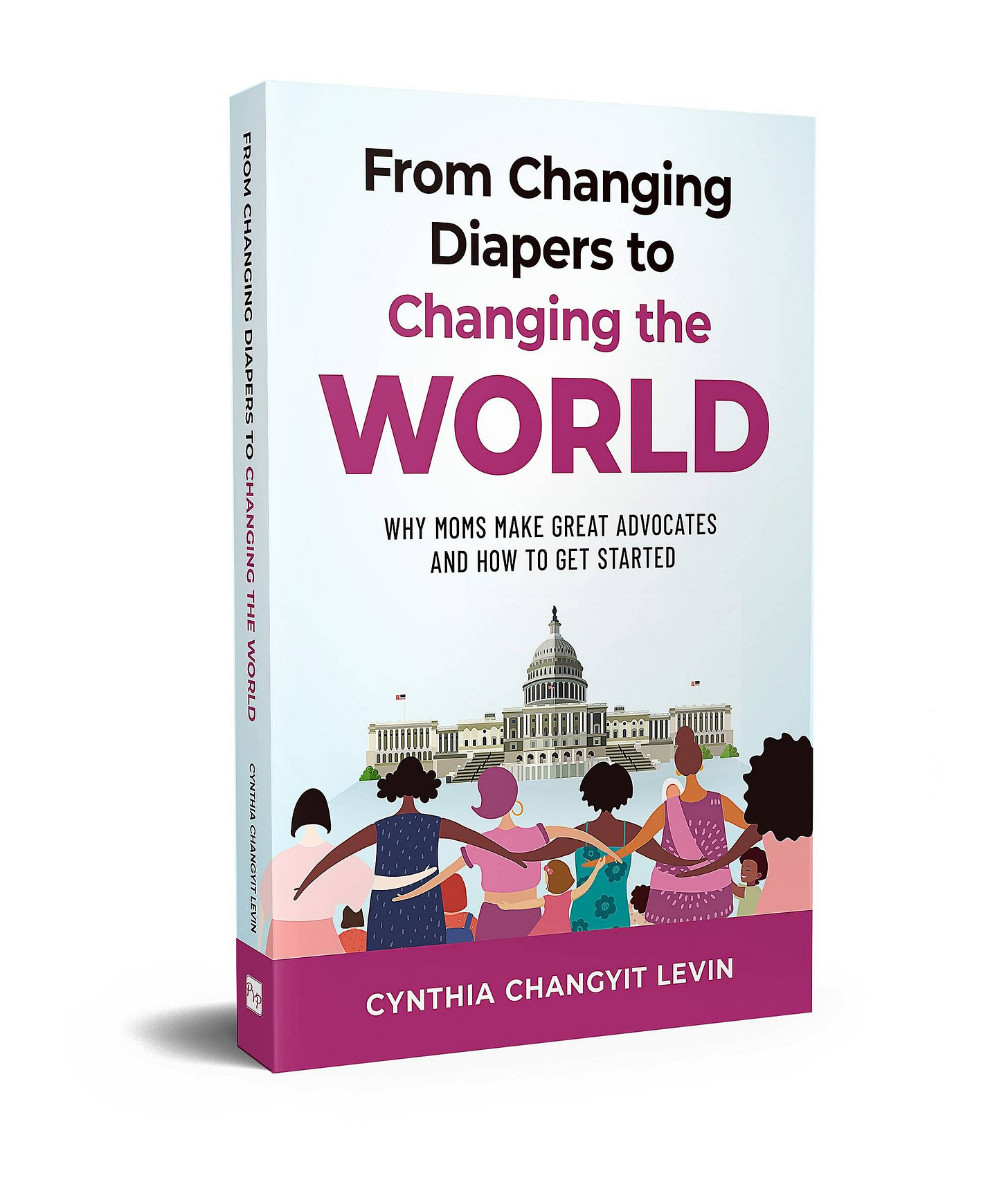The poster you see in the picture hangs in my local Starbucks and it earns a grunt of annoyance from me every time I see it. It says, “Well, that’s an hour I’ll never get back, said no volunteer ever.” I think the person who designed it has never done volunteer organizing at all! I swear to you that most volunteers have thought that quote to themselves at one point or another. Truly, I think it myself every time I attend a poorly-run meeting.
Volunteers are wonderful people. They give freely of their time to make the world a better place whether they are citizen lobbyists or soup kitchen servers. Parents who volunteer are doubly special because they take time away from swiftly-growing children for causes they believe in. Therefore, as organizers, we need to value the precious hours they give us by providing enriching and rewarding experiences! Without that, volunteers will drift away looking for the next thing that will give meaning to their work.
As advocacy organizers we need to give people solid reasons to keep coming back. Laying on guilt trips or demanding more work isn’t going to cut it. They might be inspired to come for a few times out of anger at government policies, friendship for you, or admiration of a political figure. But if we can’t offer people something they need, why would they come back to spend even one minute more with us?
Here are my best ideas for about volunteers engaged in your group:
Overcome barriers to participation
What they get out of it: Help with life challenges
When it’s possible to meet the specific needs of volunteers, we can benefit the group as a whole! Food is sometimes an overlooked need, but I’ve seen meals be a draw for a group. One of our RESULTS members in St. Louis generously provided delicious Indian dishes, pizza, and cookies for our monthly meetings. Everyone looked forward to her hospitality. It made us want to go out of our way to attend meetings in person, instead of zoom, for her home-cooked specialties. For an anti-poverty group, this can be especially wonderful because low-income folks can enjoy it without the embarrassment of not being able to afford something at a coffee shop meeting.
Another example comes from the Sunrise Movement, a youth-led climate justice advocacy group, with national working meetings over zoom. My kids found out there were teachers and older students in the group willing to provide informal homework help in breakout rooms. How invaluable for kids who wanted to help, but worrie about not being able to finish an assignment! If they came, they got to contribute AND got the tutoring they needed.
Sometimes, a barrier might even simply be acceptance. If people from a marginalized group, like non-English speakers or trans folks, find your meetings to be welcoming space they can’t find elsewhere in your community, that might be the most valuable thing you can offer any volunteer. As a mom of young kids, I stayed with RESULTS when my kids were small because the local folks in Chicago were the advocacy group most welcoming and flexible to our strange schedule.
Empower Your Volunteers
What they get out of it: A feeling of self-worth
Don't think of your volunteers as minions carrying out tasks. Nobody likes to feel ordered around! Cultivate leaders by giving them full ownership of their responsibilities. Help them to see their part in your shared vision and decide the best way they can accomplish the goal themselves. In this way, teammates can share their creativity and personal strengths with one another.
Since I’m a mom, I’ll point out this is remarkably similar to the parenting technique where you give kids the responsibility for picking up their rooms by a certain time, but don't micro-manage how it gets done. Cleaning kids can sing while they do it, they can sort alphabetically, they can pick up toys by color...it's up to them!
Above all, let your volunteer own the task. You can certainly coach a novice through a task, but don’t take it away and do it for them if it’s not going the way you envisioned. I was guilty of this in my early organizing days with poor results. It only leads to you, the leader, doing way more than you should and the volunteer getting the message that they are an unnecessary burden.
Find new activities & goals for your group
What they get out of it: Skill-building
Doing the same thing over and over gets stale. Luckily, there are many ways to advocate! Breathe new life into your activism by involving different kinds of people or learning skills together. If the group seems tired of just writing letters to Congress together or burned out from prepping for congressional meetings, try teaching a girl scout group to take action with you by making posters! Or, take letter writing to the next level by writing a letter to the editor for print in your local newspaper. Take your whole group out to birddog a candidate at a town hall. Creative outreach events and fundraisers to attract new supporters are also great opportunities for all sorts of memorable interactions.
Celebrate the results group efforts
What they get out of it: Sense of purpose in the community or world
It's incredibly important that we specifically tell volunteers how their efforts have helped change the world or helped an individual person.

Celebrations can be as small as surprise logo cupcakes and fake bubbly at a meeting while discussing a legislative win and what it means for people in poverty. (Since my RESULTS team is 50% middle and high schoolers, bubbly for that group is sparkling apple cider) But when we finally got the Education for All global education bill passed after 10 years, we held a celebratory brunch to recap all our efforts and think about the ways it will transform lives. Heck, yeah, that deserved a brunch!
Appreciate & recognize individual effort
What they get out of it: Sense of accomplishment and recognition
Sometimes it's a simple "Way to go!" given in private. Other times, public recognition on social media or a heartfelt, hand-written note are better ways to show your appreciation for volunteer efforts big and small to make your volunteers feel seen. My friend Teresa Rugg was the Advocacy Teams Training Consultant for the Friends Committee on National Legislation. She knows that being cognizant of where volunteers are in their own life journeys and what gifts they can share in the moment is so important. She shared, “We are always careful that we celebrate all of the actions that the teammates can bring, whether they brought the salad or took down names at an event. Every single contribution is important to the team. Someone opened up their home. Someone shared a story in a lobby visit that no one else could tell. This attitude is omnipresent when I’m training teams.”
How are you keeping your team engaged?
How to Purchase My Book
My book, “From Changing Diapers to Changing the World: Why Moms Make Great Advocates and How to Get Started,” is a warm and witty guidebook helping moms to make a better world for all of us. It provides inspirational stories and step-by-step instructions for new and experience activists to get more involved in advocacy!
Buy an autographed copy from my website at www.changyit.com/books.
Order online at bookshop.org or Barnes & Noble.
Order from any independent bookstore near you!






